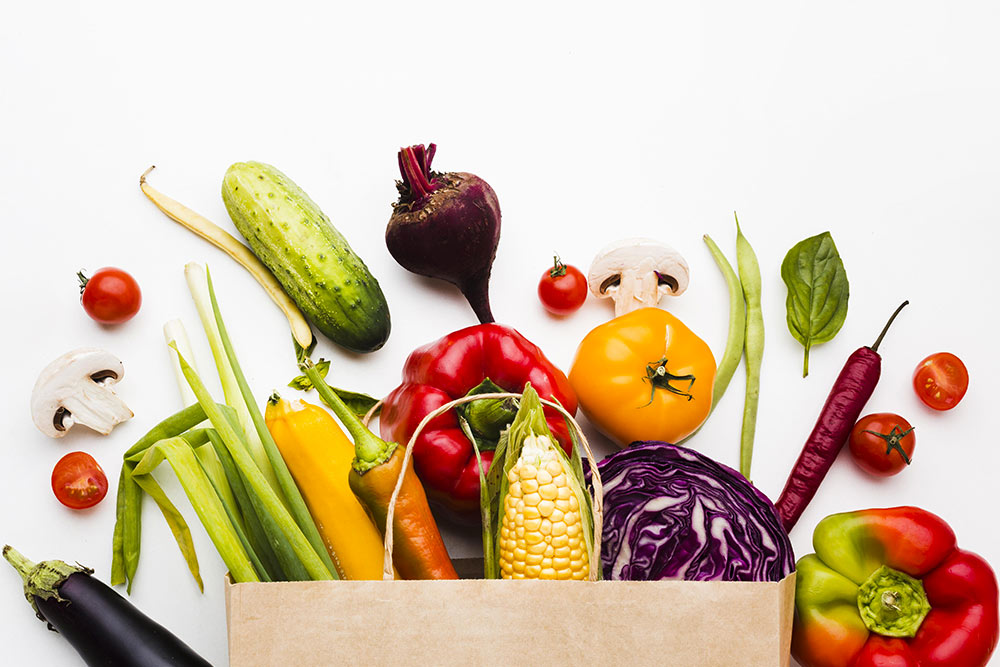Anti-Cancer Foods: Fight it with the Right Nutrition
One of the primary ways to reduce the risk of developing cancer is to adopt a healthy and balanced diet. Some foods defined as anti-cancer are known for their protective properties, while others may increase the risk of the disease. Some general guidelines for anti-cancer diet include:
- Increasing consumption of fruits and vegetables: fruits and vegetables are rich in vitamins, minerals and antioxidants that can help protect cells from free radical damage.Consuming a variety of colorful fruits and vegetables can provide a wide range of health-beneficial nutrients.
- Choosing Whole Foods: whole foods, such as whole grains, legumes, and seeds, are rich in fiber and other essential nutrients. Fiber can help maintain a healthy digestive tract and reduce the risk of colon cancer.
- Limit Processed Meat and Red Meat Consumption: processed meat and red meat have been associated with an increased risk of certain types of cancer, such as colon cancer. It is advisable to limit the consumption of these meats and choose healthier options, such as fish, poultry, or plant-based protein sources.
- Moderate Sugar and Alcohol Intake: excessive consumption of sugar and alcohol can contribute to inflammation and weight gain, factors associated with cancer risk. It is important to moderate the intake of sweets, sugary beverages, and alcoholic drinks to maintain a healthy weight and reduce the risk of this disease.
1. Broccoli and Cauliflower: An Anti-Cancer Cruciferous Duo
Broccoli and cauliflower are vegetables from the cruciferous family, rich in phytochemicals such as glucosinolates and sulforaphane. These compounds have demonstrated potent anti-tumor properties and the ability to block the growth of cancer cells. Scientific studies have highlighted that regular consumption of broccoli and cauliflower may be associated with a reduced risk of developing various types of cancer, including breast, lung, and colon cancer.
Broccoli, in particular, is an excellent source of vitamin C, vitamin K, folic acid, and fiber. Vitamin C acts as an antioxidant, helping to protect cells from damage caused by free radicals. The fiber content of broccoli supports digestive system health and may help reduce the risk of colon cancer.
On the other hand, cauliflower is an important source of vitamin C, vitamin K, and folic acid. It also contains glucosinolates, which are converted into active compounds known as sulforaphane during chewing and digestion. Sulforaphane have demonstrated the activation of enzymes in the body that play a key role in neutralizing carcinogenic compounds and promoting the death of tumor cells.
2. Tomatoes and Carrots: Vibrant Colors and Protective Properties
Tomatoes and carrots are rich in antioxidants such as lycopene (tomatoes) and beta-carotene (carrots). These antioxidants play a key role in neutralizing free radicals and protecting cells from oxidative damage. Lycopene in tomatoes, for example, has been associated with a reduced risk of prostate cancer. Carrots, on the other hand, are beneficial for eye health and may reduce the risk of lung tumors.
Lycopene is a carotenoid that gives tomatoes their characteristic red color. Studies have shown that lycopene can help protect DNA from mutations and inhibit the growth of cancer cells. Moreover, the consumption of lycopene has been associated with a reduced risk of prostate cancer.
Carrots, on the other hand, are rich in beta-carotene, which is converted into vitamin A in the body. Vitamin A is essential for eye and immune system health. Additionally, beta-carotene acts as an antioxidant, protecting cells from free radical damage and reducing the risk of lung tumors.
3. Garlic and Onion: Fragrances Defending Health
Garlic and onion are aromatic spices commonly used in cooking, but they are also true allies in cancer prevention. They contain sulfur compounds such as allicin, known for their anti-tumor properties. Garlic has been associated with a reduced risk of stomach and esophageal tumors, while onions may help protect against colon and breast cancer.
Allicin is the active compound in garlic, known for its antioxidant and antibacterial properties. Studies have shown that allicin can reduce the growth of tumor cells and induce tumor cell death. Furthermore, garlic is known to stimulate the immune system and promote the release of anti-tumor enzymes.
Onions contain similar sulfur compounds that can act synergistically with garlic’s allicin to provide even stronger protection against cancer. Some studies have suggested that regular consumption of onions may reduce the risk of colon and breast cancer.
4. Berries and Grapes: A Cascade of Antioxidants
Berries (such as strawberries, blueberries, raspberries) and grapes are rich in anthocyanins, flavonoids, and other phytochemicals that give them intense colors. These compounds have powerful anti-inflammatory and antioxidant properties, protecting cells from free radical damage and preventing the development of cancer cells. Studies have suggested that berries and grapes can reduce the risk of colon, breast, and prostate cancer.
Berries, like blueberries, are known for their high anthocyanin content, powerful antioxidants that can help protect cells from oxidative damage. These compounds may also help prevent chronic inflammation, which is associated with an increased risk of cancer.
Grapes, in particular, are rich in resveratrol, a polyphenolic compound known for its antioxidant and anti-inflammatory properties. Studies have demonstrated that resveratrol can inhibit the growth of cancer cells and reduce the risk of breast, colon, and prostate cancer.
5. Green Tea: An Infusion of Health Benefits
Green tea is known for its beneficial properties for health, including its potential preventive effect against cancer. Green tea is rich in polyphenols, especially catechins, which have been shown to inhibit the growth of cancer cells and activate anti-tumor processes in the body. Regular consumption of green tea has been associated with a reduced risk of prostate, breast, lung, and colon cancer.
The catechins in green tea are a group of antioxidant compounds that can help protect cells from free radical damage and reduce inflammation. These compounds can also interfere with the process of forming new blood vessels that feed tumors, thus reducing their growth and spread.
Nutritional Support during Oncology Treatments
For individuals facing cancer and undergoing oncology treatments, nutrition can play a key role in supporting overall well-being and improving the quality of life. Some important nutritional advice includes:
- Maintain Adequate Caloric Intake: during oncology treatments, it can be challenging to maintain adequate caloric intake due to side effects such as nausea, vomiting, or loss of appetite. It is important to focus on nutrient-dense and calorie-dense foods to meet the body’s energy needs.
- Hydrate Adequately: hydration is fundamental to support body functions and manage treatment side. Drinking enough fluids can help prevent dehydration and improve overall well-being.
- Manage Side Effects: some treatments can cause side effects such as mucositis, dry mouth, difficulty swallowing, or loss of taste. Choosing soft, fresh, and easy-to-chew foods can help alleviate these symptoms.
- Consult an Oncology Nutritionist: each individual has different nutritional needs during the cancer care journey. Consulting an oncology nutritionist can help develop a personalized meal plan to address specific challenges during treatments.
Conclusions
Choosing a diet rich in anti-cancer foods can play a crucial role in preventing this devastating disease. Regularly incorporating broccoli, cauliflower, tomatoes, carrots, garlic, onions, berries, grapes, and green tea into our diet can contribute to protecting our bodies from cancer cells and promoting optimal health. Always remember to combine a healthy diet with an active lifestyle to maximize the benefits for your health.






